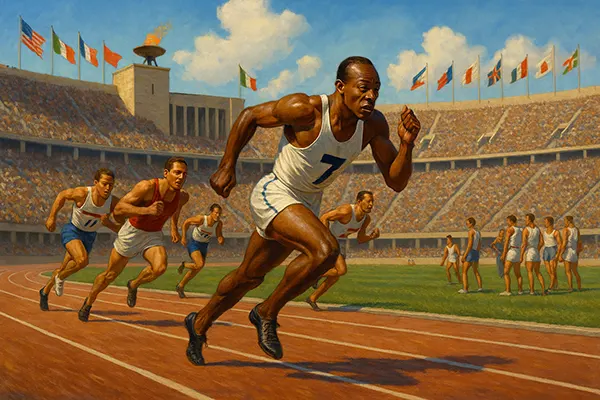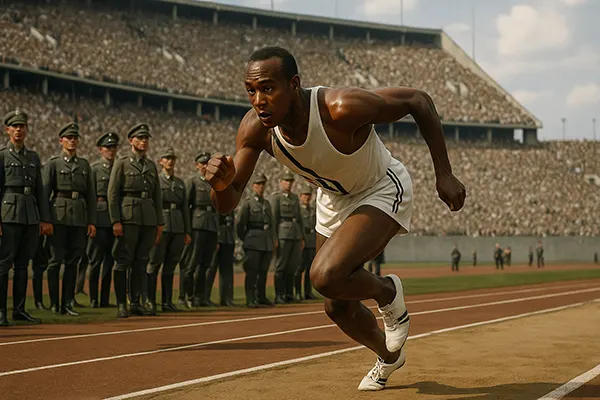Olympics 1936: When Sport Became Politics

The 1936 Berlin Olympics marked a turning point in both sporting and political history. What was meant to be a global celebration of athletic excellence turned into a stage for Nazi propaganda. Yet, amidst this manipulation of sport for ideology, an African-American athlete named Jesse Owens rose above prejudice, proving that human achievement knows no racial boundaries.
The Political Climate of the 1936 Olympics
When Berlin was chosen to host the 1936 Olympic Games, the world was unaware of what Germany would become under Adolf Hitler’s rule. By the time the Games began, the Nazi regime had already taken hold, promoting its ideals of Aryan superiority and nationalism. The event became a tool to project the image of a strong, unified Germany recovering from the turmoil of World War I and the Treaty of Versailles.
Massive investment went into the infrastructure, including the construction of the monumental Olympic Stadium. Every detail—from flags to ceremonies—was designed to impress foreign visitors and legitimize Hitler’s government on the international stage. The Nazi Party carefully controlled media coverage, showing a tolerant and civilised Germany while hiding the ongoing persecution of Jews and other minorities.
Internationally, the Games were controversial. Some countries considered a boycott, but most participated, believing sport could rise above politics. In reality, Berlin 1936 was one of the first examples of how international sports could be exploited for ideological purposes.
Propaganda and Global Perception
The Nazis saw the Olympics as an opportunity to showcase Germany’s supposed superiority. Leni Riefenstahl’s documentary “Olympia,” filmed during the event, remains one of the most famous examples of political propaganda in sports cinema. It portrayed athletes in idealised, almost mythological ways, aligning perfectly with Nazi ideology.
However, this façade did not go unchallenged. Foreign journalists reported the hidden political undertones, while some athletes expressed discomfort competing under swastika banners. The Games successfully fooled some observers but also sowed doubts among others who sensed the darker motives behind the spectacle.
The Berlin Olympics revealed how the universal language of sport could be used to manipulate global perception. This precedent would shape future discussions on the relationship between politics and sportsmanship for decades to come.
Jesse Owens: The Triumph of Human Spirit
Amid this politically charged atmosphere, Jesse Owens emerged as the true star of the 1936 Games. Born in Alabama and raised in Ohio, Owens had faced racial discrimination throughout his life. Yet, in Berlin, his performances transcended barriers, shattering Hitler’s myth of Aryan superiority with grace and excellence.
Owens won four gold medals—in the 100 metres, 200 metres, long jump, and 4×100 metres relay. His athletic achievements were unparalleled, but it was his dignity and humility that captured the world’s admiration. He became a symbol of equality and the unbreakable human spirit.
Despite his success, Owens faced challenges upon returning home to the United States, where racial segregation persisted. His story thus became both a victory and a reminder of the inequality that extended far beyond the borders of Nazi Germany.
Legacy of Jesse Owens
Owens’ legacy extended beyond sport. He became a global symbol of resilience, challenging not only Hitler’s ideology but also the broader system of racial injustice. His triumph was a statement that athletic greatness could not be defined by race or nationality.
In later years, Owens worked as a public speaker, advocating for equality and education. His words carried the same strength as his strides on the track. He reminded future generations that sport has the power to unite rather than divide.
Today, his achievements remain a cornerstone in Olympic history, embodying the true spirit of fair competition and human unity—a message as relevant now as it was in 1936.

The Long-Term Impact of the 1936 Olympics
The Berlin Olympics set a precedent for how global sports could be intertwined with politics. It demonstrated how governments could manipulate international events to shape their image, but it also revealed sport’s ability to resist such exploitation through individual heroism and integrity.
Future Olympic Games continued to reflect global tensions—from Cold War boycotts to protests for human rights. Yet, the 1936 Games stand out as a reminder that political agendas can never fully suppress the values of respect, diversity, and determination.
Moreover, the event contributed to the evolution of sports journalism and international broadcasting. For the first time, the world experienced the Olympics as a mass-media event, shaping public opinion far beyond the stadium.
The Symbolism of 1936 in Modern Context
Looking back from 2025, the 1936 Olympics still resonate. In an era of global conflicts and ideological divisions, the lessons from Berlin remind us that sport can be both a mirror and a challenge to political power. It can reflect society’s flaws but also highlight its potential for unity.
Modern Olympic movements continue to grapple with political influence—from diplomatic boycotts to debates over human rights in host nations. The spirit of Jesse Owens serves as a moral compass, guiding athletes and organisers to prioritise fairness, inclusion, and respect.
The story of Berlin 1936 remains one of history’s most powerful examples of how courage on the track can confront tyranny and how one person’s victory can redefine the meaning of sport for generations to come.
